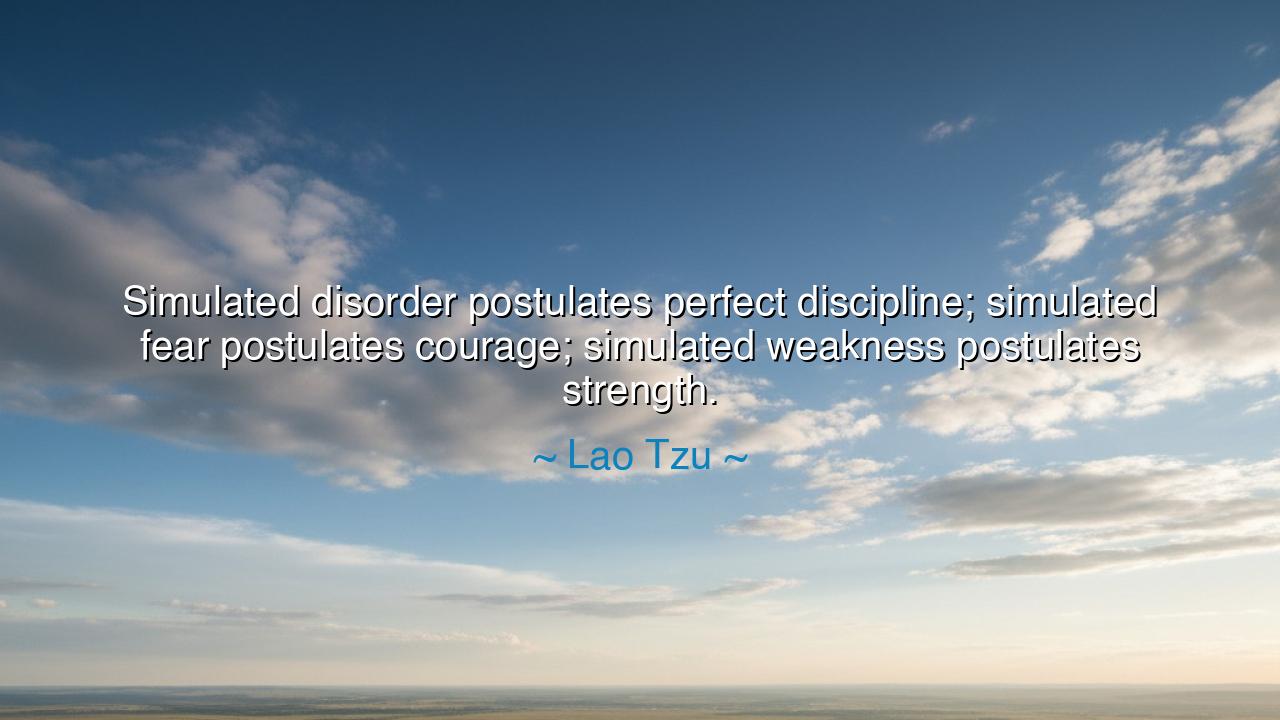
Simulated disorder postulates perfect discipline; simulated fear
Simulated disorder postulates perfect discipline; simulated fear postulates courage; simulated weakness postulates strength.






Lao Tzu, the ancient sage of the Way, once uttered words that echo through the corridors of time: “Simulated disorder postulates perfect discipline; simulated fear postulates courage; simulated weakness postulates strength.” These words, drawn from the depths of the Tao, reveal not a trick of deception, but a profound understanding of the balance of opposites. In the softest gesture lies the greatest power, in apparent confusion lies mastery, and in humility hides the seed of dominion. To those who have eyes to see, this is not contradiction — it is harmony. For the wise know that what appears is often not what is, and that truth wears many veils.
When Lao Tzu spoke of simulated disorder, he spoke as a master of strategy, a seer of life’s hidden rhythm. True discipline does not flaunt itself; it moves unseen, graceful as the tide. A commander who appears chaotic may in truth control every strand of fate; his seeming disorder is but the cloak of preparation. The untrained mind rushes in straight lines; the disciplined one bends like water, flowing around obstacles unseen. The sage knows that the appearance of confusion can lull the careless enemy, just as the bending reed survives the storm that breaks the oak.
History gives us many witnesses to this truth. Sun Tzu, the great general who followed the Tao’s wisdom, once led armies that seemed to wander without aim. His men appeared weary, his formations broken — yet in that seeming disarray lay a perfect design. When the moment came, he struck with the precision of lightning, and his foes, who believed him weak or lost, were scattered like chaff before the wind. Such is the way of mastery: it hides itself in semblance, and its strength lies in the art of concealment. The true warrior does not need to boast; his calm disguises the storm within.
In the same way, simulated fear is not cowardice, but courage refined by wisdom. The brave do not always shout their valor from the rooftops. Sometimes they tremble — not from weakness, but from an awareness of what is at stake. The wise man may bow before danger, not because he yields, but because he is measuring it. He knows that to pretend fear is to learn patience, to strike not from impulse, but from clarity. Thus, he conquers by restraint. So too in life: the one who dares to show humility and hesitation when others rush blindly forward preserves his strength for the moment that truly matters.
And simulated weakness — ah, this is the most subtle of all! For to appear weak when one is strong is the highest art of strength. It is the art of the river, which yields to the rock and yet wears it down through time. The wise do not display their might before those who would envy or challenge it; they move with softness, allowing others to underestimate them. The tiger crouches low before the leap, and the sun dims before the dawn. Only the fool seeks to prove his strength at every turn; the sage keeps his sword sheathed until the right hour, and then his strike is final.
This teaching is not merely for warriors, but for every soul who seeks mastery of life. In times of confusion, practice discipline. When fear rises, cultivate courage. When you feel powerless, remember the strength that sleeps beneath still waters. The one who lives by appearances is a leaf blown by the wind; the one who lives by awareness is the wind itself. The art of the Tao is to hold opposites in your hands and see they are one. Outward humility, inward strength; outer quiet, inner fire.
So, child of the present age, take heed: do not rush to show your greatness. Let your actions reveal it when the time is ripe. Train your discipline so deeply that even your chaos has order. Temper your courage so truly that even your fear becomes a mask of readiness. Guard your strength so quietly that others see only gentleness — until the moment you choose to rise. This is the way of Lao Tzu, the way of the hidden master: to win without struggle, to lead without boasting, and to shine without seeking the light.






AAdministratorAdministrator
Welcome, honored guests. Please leave a comment, we will respond soon